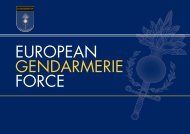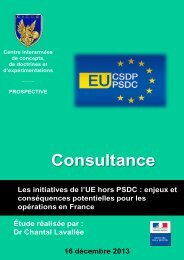Conference
science-research-bulletin-2013-conference
science-research-bulletin-2013-conference
You also want an ePaper? Increase the reach of your titles
YUMPU automatically turns print PDFs into web optimized ePapers that Google loves.
EUROPEAN POLICE SCIENCE AND RESEARCH BULLETIN<br />
SPECIAL CONFERENCE EDITION<br />
above typology suggest, raises profound issues of<br />
accountability to politics and to law. It also helps<br />
to frame empirical enquiry about day-to-day<br />
global policing so that very little gets left out.<br />
The practical complexity of the global policing<br />
sector means that a great deal of what goes on<br />
in it remains relatively under-explored, or at least<br />
that exploration is known only to a relatively select<br />
number of people (Henry and Smith, 2007).<br />
Given the high degree of social anxiety previously<br />
discussed, and the organisational complexity, it<br />
is clear why the simplistic functional justifications<br />
for global policing are required. Narratives about<br />
global policing and certain suitable enemies —<br />
‘paedophiles’, ‘terrorists’ and ‘serious organised<br />
criminals’, for example — provides a legitimation<br />
rhetoric which hides a complex set of practices<br />
left un-told. Ironically, the institutional nexus<br />
of global policing (which is intimately related to<br />
global governance) is ungoverned and, as things<br />
stand, ungovernable.<br />
POLICING STUDIES AND<br />
POLICING SCIENCE<br />
Enlightenment police science started off as an<br />
idea associated with the whole art of government.<br />
By the twentieth century, the language of police<br />
science had changed quite a bit. There are<br />
different opinions about what constitutes the<br />
most important historical landmark by which<br />
to characterise police science in the twentieth<br />
century. One candidate is the invention of radiodispatched<br />
police patrol. The later introduction<br />
of other new technologies into the organisation<br />
of police systems cascaded in on a process of<br />
the ‘scientification of police work’ (Ericson and<br />
Shearing, 1986). The history of 20th century<br />
policing is a history of continuous technological<br />
transformation. Beginning in the mid-20th<br />
century there began to spring up some academic<br />
interest in policing as an object of empirical<br />
enquiry. Several ethnographic studies became<br />
famous landmarks in a small academic cottage<br />
industry in the United States and the United<br />
Kingdom (Newburn, 2011). In the United States,<br />
James Q. Wilson was an early pioneer in this new<br />
academic industry. His Varieties of Police Behaviour<br />
(1968) was a landmark study in the administration<br />
of comparative police science management in<br />
eight communities. Broadly speaking, two types<br />
of research can be distinguished: research for<br />
policing and research about policing. The former<br />
is police science (eg. Sherman, 2009) the later is<br />
police studies (eg. Reiner, 2012).<br />
It is not a case of either police science or police<br />
studies, it is a case of both police science and<br />
police studies. The demands for both training<br />
and education among all ranks of policing and<br />
security professionals are for well-rounded<br />
professionals capable of solving novel problems<br />
with innovative solutions. Too much science can<br />
become ‘controlology’, too much study risks the<br />
‘paralysis of analysis’. An appropriate balance<br />
must be struck. Not wanting to veer off on too<br />
much of a tangent into the philosophy of science,<br />
we would simply concur with the view of Sir<br />
Karl Popper that scientific claims are falsifiable;<br />
what makes policing scientific is some minimal<br />
commitment to ‘falsifiability criteria’. Police<br />
science need not be strapped to the procrustean<br />
bed of experimentalism in order to be scientific<br />
(cf. Sherman 2009). The descriptive case study<br />
can be rigorously scientific. For example,<br />
Darwin’s observations taken on his travels<br />
aboard the HMS Beagle, or the confirmation of<br />
the theory of continental drift by geophysicists<br />
in the mid-20th century are both examples of<br />
good science, but they are not experimental<br />
science. In the same way, a descriptive case study<br />
of Caribbean Policing (Bowling, 2011) or the<br />
relationship between police and public (Smith<br />
and Gray, 1985), or a comparative description<br />
of European and Australian policing (Hufnagel,<br />
2013) can certainly be considered empirical<br />
contributions to the understanding of the global<br />
police system that are scientific insofar as they<br />
are falsifiable. There is a fruitful nexus between<br />
police studies and police science. What we<br />
advocate is an interdisciplinary approach that<br />
promotes reflexive thinking. Because the means<br />
of policing are so powerful (surveillance powers,<br />
arrest and detention, potential use of force),<br />
it is important that any would be purveyors of<br />
those means are dissuaded from the hubris that<br />
holds that ‘reality is wholly knowable, and that<br />
knowledge and only knowledge liberates, and<br />
absolute knowledge liberates absolutely’ (Isaiah<br />
Berlin, quoted in Hitchens, 1998).<br />
The promotion of a balanced understanding of<br />
policing as both ‘studies’ and ‘science’ is to look for<br />
a way to govern governance. The interdisciplinary<br />
approach we advocate aims to turn the whole<br />
policing field which was previously considered<br />
ungovernable (if it was considered at all) into an<br />
object of governance.<br />
15





